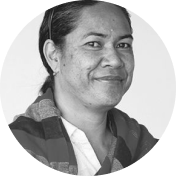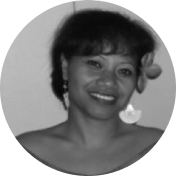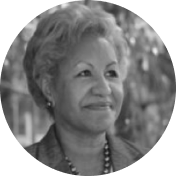Our flagship research program, Humanitarian Horizons, is a four-year initiative generating evidence-based research and creating conversations for change.
The Humanitarian Horizons 2018-21 program consisted of four research streams: Intention to Impact: Localised Humanitarian Action, Diverse and Inclusive Humanitarian Leadership, Building a Blueprint for Change and Partnerships & Practice. The establishment of these research streams was informed by sector-wide research we conducted to determine key research priorities that would help progress the sector as a whole. This is a process we conducted again, to inform the design of Humanitarian Horizons 2021-24.
The current momentum for supporting localised humanitarian action will increase as we generate more evidence that demonstrates its impact.
Humanitarian leadership does not currently reflect the diversity of talent existing in organisations and disaster-affected communities.
Transformative systemic change is complex and challenging, with a need to progress the operationalisation of humanitarianism.
Our research practice papers, guidance notes, Research Advisory Committee, monitoring and evaluation and sector events are included in this stream.
We developed long-term research partnerships with key national and regional organisations. We piloted and hypothesised, collaborated and produced evidence to influence policy and practice across the sector. We engaged with Australian, regional and international stakeholders and witnessed the uptake and use of our research in many forums and countries.
We always seek to support strong local ownership of design, process and outcomes. We are committed to supporting local and national researchers, and across the course of the program established funded partnerships that also sought to meet our partner’s goals and priorities.
We set ourselves the challenge and designed an M&E Framework that articulated our objectives for the streams and for the overarching program.
Throughout the 2018-21 program, we tested out different ways of exploring the impact of our research. In addition to producing influential publications, the research design and implementing it with our partners promoted change to the way we conduct and think about humanitarian response.
What emerged was a rich snapshot of both incremental and significant influence on humanitarian narratives and conversation, partner visibility, humanitarian practice and other research and policy in our sector. The strong ownership of the research by our national partners had led to exciting and transformative examples of change. With this data, we adapted and strengthened our research, and are keen to share what we learned.
A mid-term review of the program was undertaken by Pacific group COLAB in 2020, which detailed the program’s strengths and successes, and areas that can be strengthened.
The role of the Research Advisory Committee was to provide strategic advice for the research program and inform research priorities, processes and findings.

Emeline Siale Ilolahia is the Executive Director of the Pacific Islands Association of Non-Government Organisations (PIANGO) based in Fiji. Siale is a Tongan civil society leader, women’s advocate and activist. As the Executive Director of PIANGO, Siale represents the interests of Pacific civil society in a range of regional and international forums. Through her work with PIANGO and several coalitions and organisations in Tonga, Siale has been engaged in joint PIANGO- Humanitarian Advisory Group (HAG) research on diverse and inclusive humanitarian leadership and measuring localisation in several Pacific Islands Countries. Siale was previously the Executive Director of the Civil Society Forum of Tonga.

Fine Tu’itupou-Arnold is the Secretary-General of the Cook Islands Red Cross Society (CIRCS). Prior to this, she was International Humanitarian Law Officer for the CIRCS with responsibilities for both IHL and international disaster response law. In her role as CIRCS IHL Officer, Fine disseminated information on IHL and the fundamental principles of the Red Cross and Red Crescent to raise awareness and respect for IHL in the Cook Islands. Fine was instrumental in establishing the Cook Islands National IHL Committee to assist the government in fulfilling its obligations on IHL Conventions and related matters.

Jeremy Wellard is International Council of Voluntary Agencies (ICVA) Regional Representative for Asia. Jeremy is responsible for ensuring the global policy and program work of ICVA connects to and is informed by, member organizations throughout the region. Prior to this role, Jeremy worked for UNOCHA’s Regional Office for Asia and the Pacific as part of the World Humanitarian Summit team, coordinating Asian representation throughout the Summit process and organizing The South and Central Asia Regional Consultation in Tajikistan and the WHS Global Consultation in Geneva.

Erika Feller is currently a Vice-Chancellor’s Fellow at the University of Melbourne. From 2005 to April 2013, she held the post of Assistant High Commissioner (Protection), one of the four top management positions with the United Nations High Commissioner for Refugees. This was the culmination of a 26-year long career with UNHCR, and had been preceded by 14 years service as an Australian diplomat, in Canberra and overseas. For UNHCR, Erika served both in Geneva and in the field, notably as the High Commissioner’s Representative for Malaysia, Singapore and Brunei.

Saku Akmeemana is the Principal Specialist for Governance at the Australian Department of Foreign Affairs. In that role, she is responsible for guiding the Department’s approach to governance, political economy, state fragility and conflict, in its development assistance portfolio. She has spent much of her career working on governance, conflict and the political economy of development, straddling both headquarters and field assignments in the World Bank and United Nations. In a decade at the World Bank, principally in South Asia, East Asia and the Pacific, her research and operational work has focused on the political dynamics of institutional change; justice, grievance and the drivers of violent conflict; service delivery and the state-citizen interface.

Emele Duituturaga is the Executive Director of PIANGO (2009 – current). She was one of the founding Global Co-Chairs of the newly formed CSO Partnership for Development Effectiveness based in the Philippines. She is also the Pacific representative on the Global Executive Council of the International Forum for National Platforms based in Paris. She has also been appointed as one of the 10 members for Global Advisory Group for Bread for the World, based in Berlin. Emele was a Pacific regional representative at the World Humanitarian Summit.